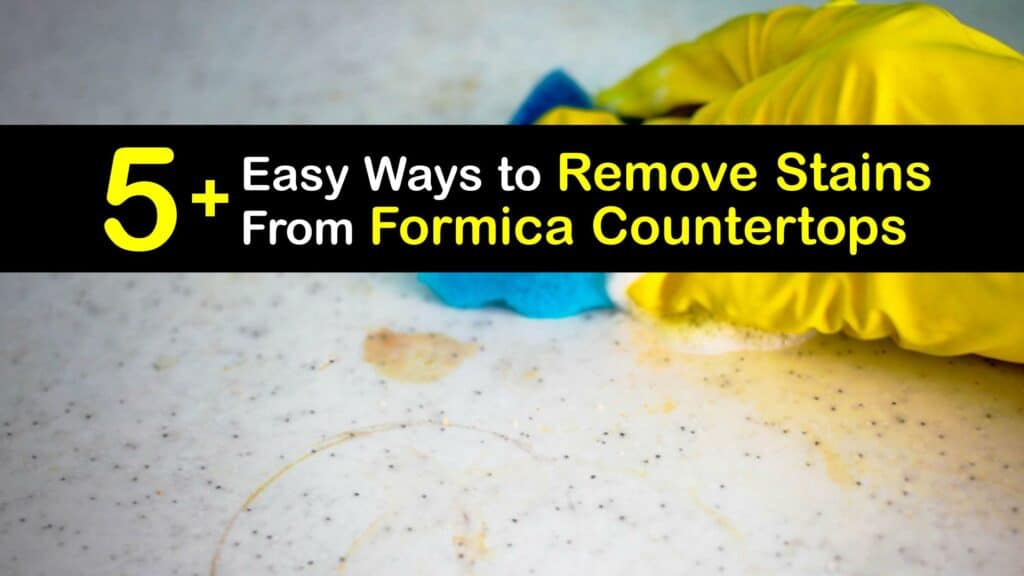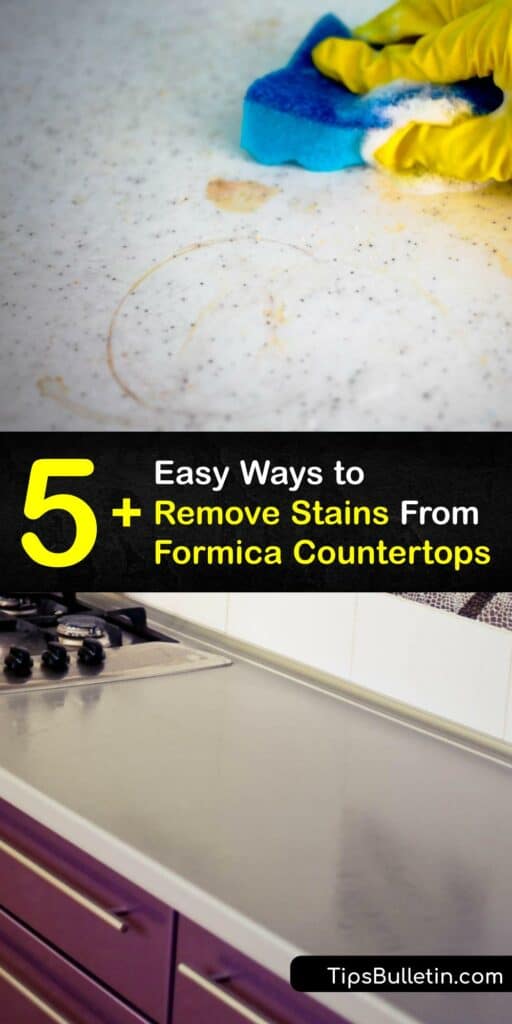Did you decide on Formica for your kitchen counters and cabinetry? Laminate looks gorgeous in the kitchen, but knowing how to remove stains from Formica countertops is crucial to protect your investment. Laminate is famous for its durability and flexibility in design. Formica countertops are made with a decorative paper piece sealed underneath a tough resin coating.
The printed design is completely customizable, giving you the look of your favorite natural stones or other more unusual patterns while maintaining an easy-to-care-for finish. If you don’t know how to get stains off Formica countertops, it’s easy to damage your kitchen surfaces inadvertently. Although Formica is tough, the resin degrades with deeply abrasive or caustic cleaning.
Kitchen counters are prone to stains, from spilled sauces to food residue. Thankfully, there are straightforward ways of removing stains from Formica countertops without destroying them. Forgo toxic chemicals and use everyday products to clean your kitchen counters without ruining the laminate.

How to Get Stains off Formica Countertops
Learning how to remove stains from Formica countertops is vital to ensuring your kitchen is clean and sanitary. Your kitchen countertop is a site for meal preparation, using kitchen appliances, and plating food. Follow along for great solutions for food color stains on new countertops along with hard water stains, glue, and more.
Over time, hard water stains develop and degrade the resin coating on the laminate. Use simple tips for removing stains from Formica countertops with hydrogen peroxide, dish soap, baking soda, and a Magic Eraser.
What Is Formica?
Countertops made from Formica laminate star in numerous kitchen designs. Formica kitchen countertops, like other laminate countertops, are constructed from layers of plastic adhered to particleboard or kraft paper to produce a sturdy, long-lasting counter surface.

The result is a polished, finished appearance resembling natural stone or wood counters. Many homeowners prefer a Formica laminate countertop because it’s durable, inexpensive, and simple to maintain.
All of us have seen gorgeous laminate countertops that mimic granite or other natural stone. These countertops have a striking appearance comparable to any luxury countertop.
They are constructed from ordinary brown kraft paper laminated with plastic resins, followed by a printed decorative layer, a robust wear-resistant layer, and a thin, transparent layer made of melamine resin for optimal protection.
Modern Formica countertops have cellulose layers infused into the plastic resins, increasing the countertop’s heat and scratch resistance. Formica counters offer an array of looks and a luxury feel for a fraction of the cost of a granite countertop or quartz countertop.
How to Remove Stains From Formica Countertops
Hydrogen peroxide is a safe and efficient product to clean countertops made of Formica. Peroxide is an oxidizing agent that uses oxygen to disinfect wounds or clean stubborn stains off your laminate countertop. You can disinfect kitchen countertops with peroxide by mixing a simple and cost-effective laminate counter-cleaning spray.
Measure and blend the hydrogen peroxide and warm water in the sprayer and swirl to combine. Liberally spray your laminate countertop with the peroxide liquid, and wipe it away with a damp cloth. For challenging stains, spray the peroxide, and leave it to sit on the Formica for a couple of minutes before rubbing it off.
Removing Stains From Formica Countertops
A mild detergent like dish soap is perfect to wash off stains from Formica countertops without fading the color. Whether dealing with intensely pigmented turmeric stains or greasy cooking spills, dish soap really works.
The surfactant in dish soap disrupts surface tension, so discoloration lifts without a fight. Use your liquid dish soap and hot water to make an affordable soapy water cleaner for your Formica countertops.
Stir the dish detergent and hot water until they’re bubbly, dip a soft bristle brush, and use this to scrub off the stain. Work in circles, taking care not to press down into the laminate. Remove soap and stain residue with a clean, damp microfiber rag and leave the Formica countertop to dry.
Baking Soda Will Clean Formica Countertop Stains
Baking soda is a famous household stain remover and cleaner and will work to remove yellow glue stains on kitchen countertops. If you prefer natural and food-grade cleaners on your meal preparation surfaces, consider using baking soda to tackle a tough stain on your laminate counter.
Baking soda is mildly abrasive, so it sloughs off food residue, grease, and other substances causing discoloration without affecting the resin on your counters. For light stains, sprinkle baking soda powder on a damp cloth to scrub the blemish. Mix a paste with equal parts baking soda powder and lukewarm water for severe staining.
Spread the paste on the stain, leave it to dry for up to an hour, and wipe it away with a clean cloth. Although baking soda tends to lighten dark colors, it’s safe for darker-colored Formica as it acts on the transparent resin layer, not the decorative paper beneath.
Baking soda is often inappropriate for granite countertops or dark natural stones.
Trust a Magic Eraser for Stubborn Stain Removal
A Mr Clean Magic Eraser is a time-tested tool for getting stains off Formica countertops. A Magic Eraser is an abrasive cleaner of dense melamine foam with many air pockets. The eraser lifts the discoloration layer by layer to clean laminate countertops without disturbing the finish.
Purchase a Magic Eraser from the cleaning supplies section at your local hardware store. Check the product label and ascertain if it’s safe to use on Formica. Unwrap the eraser and rub it back and forth over the blemish, not using it on clean regions of the countertop.
Work slowly with light pressure and pause to monitor your progress. Once the stain is abrasively removed, wipe down the counter with a damp cloth, let it dry, and check for any spots you missed.
Never Use Steel Wool or Bleach for Laminate Countertops
Some cleaning products spell disaster for a laminate surface or Formica kitchen cabinets. Corrosive treatments or heavy abrasive cleaners are unsuitable for use on a Formica countertop. Bleach is known for its industrial cleaning strength, yet the potent chemicals in traditional chlorine bleach discolor and destroy the resin coating over a laminate counter.
Heavy-duty synthetic cleaners leave fading at best and completely strip the resin, and ruin your counter at worst. Similarly, rough abrasives such as steel wool aren’t safe to use on laminate counters.
Though steel wool may eliminate the stain, it scratches and scuffs and removes the resin top coat on the Formica. Stick to mild cleaners and light abrasion to erase marks from laminate counters without changing their appearance.
Did this article enlighten you on how to get stains off Formica countertops? Formica counters are popular in kitchens thanks to their durability and diversity of colors and styles. Despite being hardwearing, laminate counters can suffer when cleaned incorrectly.
Protect your investment and keep your laminate countertops looking incredible by learning how to clean Formica effectively and safely. Rely on home products to oust stains and ensure your Formica countertops last for years.

If you loved this comprehensive article on how to remove stains from Formica countertops, please share it with your friends and family who are removing stains from Formica countertops on Pinterest and Facebook.